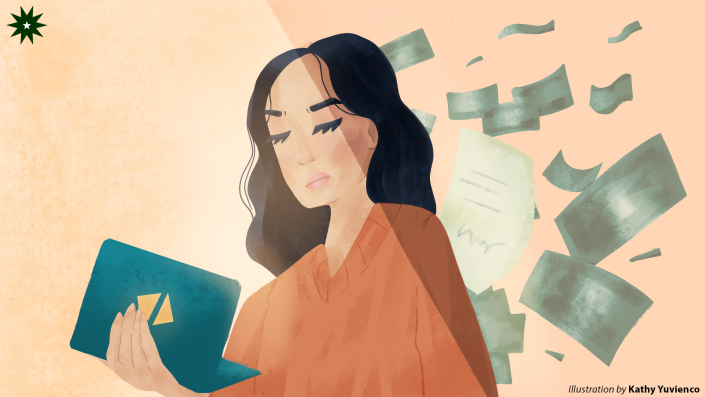While traditional nine-to-five jobs still dominate the local employment scene, many Filipinos have also ventured into freelancing. Skilled and qualified individuals may find themselves drawn to freelancing because it offers them freedom from the standard routine job, a flexible work schedule, and the chance to avoid traffic through remote work. Moreover, the industry is not exclusive to degree holders as anyone can give it a try—provided that they have the necessary skills and equipment for the job.
As attractive as the opportunities may be at first glance, more experienced freelancers know firsthand that there are several challenges beneath the seemingly endless advantages of freelancing.
Student experiences
Keana del Rosario (IV, AB-CAM) has been a freelance photographer since her first year in college. Usually, she gets jobs through word of mouth from her clients to others or from others noticing her works online. Aside from jobs given by previous clients, del Rosario has also taken up jobs that she saw from going through the DLSU Jobs and Internships Facebook group. She finds the group to be a reliable source for student freelancers like her.
On the other hand, Maegan Estuar (IV, AB-CAM), a freelance video editor, finds it difficult to look for jobs in the group. She says that there are too many people on the group to properly get a job. She also has concerns over the safety and legitimacy of the jobs offered, as not all the jobs offered are by fellow Lasallians.
Sachi Alviar (III, AB-PSM) also shares the same sentiment; she feels that administrators of groups like DLSU Jobs and Internships should implement a screening procedure for posts and group members. “[Since] di nila na-screen yung post, walang job description [or] walang job title. I think [the group administrators] don’t ask what company [is offering the opening],” Alviar points out.
‘A risk without a plan’
Joaquin Miguel Ruiz, an Assistant Professor from the Communication Department, started out as a freelance graphic designer as a way to hone his craft and earn extra cash. “[When] I went full-time freelancing in 2010, the main challenge was to have a consistent clientele…[this] will always be something that a freelancer will have to worry about,” he shares.
Another issue Ruiz encountered early on was the uncertainty of payments, which he considers to be “a common problem among the creative [industries] in general.” He had an experience with a client who consistently paid late, a situation that was only remedied when the threat of legal action was raised, he shares.
Although having contracts and other legal documents can help protect a freelancer, another key to ensuring proper and timely payment is negotiation. Ruiz acknowledges that there are some clients who can be exploitative, but he urges freelancers to know their worth, “It’s tempting to really [lower] your prices to get clientele when starting out, but you should have a gauge of your capabilities and your overall value. Pick your clients well. Those who really value your job as a freelancer [will] create favorable outcomes.”
Ruiz has come a long way as a freelancer, having worked with the likes of Maynilad and Boy Abunda for projects. As both a practitioner and an educator, he advises potential freelancers to think ahead, “Freelancing is a risk without a plan, therefore having one is crucial to the success of the potential freelancer.”

Contracts and legal matters
Atty. André de Jesus, an Assistant Professor from the Commercial Law Department, shares his advice for freelancers when it comes to legal matters. He notes the importance of oral and written contracts, though he mentions written contracts to be more advantageous.
De Jesus warns freelancers from relying too much on oral contracts as they are not tangible. Written contracts, however, can be used by freelancers as physical evidence if ever a problem arises. Moreover, the contract itself lays down the agreement and obligations of the freelancer. It serves a longer enforcement period of 10 years as opposed to an oral contract, which only amounts to six years. Ultimately, written contracts are more beneficial than oral contracts in that a physical copy can also be used for future arrangements. “It’s [going to] be much easier for [the] continuity of the business or [any] professional relationship that you have,” de Jesus affirms.
Even without a formal contract, de Jesus explains, obligations can still arise from “quasi-contracts”. A client for example, who asked a freelancer for work, cannot fairly withdraw a formal contract claiming dissatisfaction in the finished result. According to de Jesus, those clients who refuse to compensate freelancers over their work would be liable under quasi-contracts. “The principle in unjust enrichment [quasi-contract] is that the person can’t unjustly enrich himself at the expense of another person,” de Jesus explains.
As a personal initiative, de Jesus hopes to put up a legal clinic in the University to help educate all students in legal matters, “We could help [students] out there so [they] would not enter into situations [where they] have to get a lawyer for something that could have been prevented in the very first place.”
